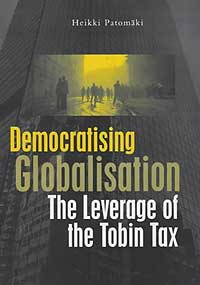| Book Review Archive 06.10.02 [53] |
|
||||
|
The Leverage of the Tobin Tax by Heikki Patomaki
The tax was originally proposed back in 1972, by James Tobin, Yale Professor
of economics. Thereafter it was shelved, only to be periodically dusted
down in the wake of some crisis or other, brought on by the financial markets
or IMF.
The Tobin Tax idea runs completely counter to the UK / USA free
market orthodoxy (what Patomaki terms the London-Wall St-Washington consensus)
and so stands little to no chance of implementation. In its original form,
Tobin suggested it would have to be international, and the purpose was to
bring stability by acting as a damping mechanism. Interest in the tax revived
in the wake of the 1997-8 Asian 'Tiger Economy' meltdown.
Patomaki advocates a two stage approach. In phase one, 30 states amounting to 20% of the global
currency markets sign up to it. Patomaki suggests that these be drawn from
the progressive Nordic countries, plus others like Argentina who have been
burned by the markets / IMF etc. Canada and France have also expressed an
interest in the proposal, various NGOs, charities, and ATTAC, a lobbying
body, has been established. If the EU or Japan could be persuaded to sponsor
it, this would be a big step forwards.
Sliding scale
Initially, in the first stage, the tax would be set at a low rate, but then,
the heat on the lobster would gradually be increased. The intention is not
to penalise holidaymakers or bona fide international trade, but short term
currency speculators. These incur a higher rate of tax, on a sliding scale,
and during crisis conditions, eg like George Soros' assault on the ERM,
the rate becomes punitive. During the last phase, countries outside the
'Tobin Tax Zone' (TTZ) are invited to join, the assumption is that one by
one, most of them will do so. In the first phase, the tax would essentially
be on trial, to try to iron out the various loopholes.
Global Panopticon
Transparency in bank transactions is needed, which implies an extensive
and total network of financial surveillance and licencing. Punitive rates
will then be set against transactions involving tax havens and offshore
centres, which will help leverage in non compliant countries. Once the idea
gets critical mass, countries will eventually be forced to join the TTZ.
Patomaki describes a bi-cameral governing structure, with representatives
of governments on one side, and representatives of NGOs on the other, chosen
by lottery, the 'House of Democracy' side having limited capacities of veto.
[p203] It is suggested that $1 -2B /yr be used to finance about half of
the UN's activities, thereby setting it free from the 'one dollar - one
vote' principle of American hegemony. Patomaki, rightly in my opinion, is
critical of US, UN and IMF attempts to suppress discussion of the Tobin
tax idea; the sacking of Boutros Ghali, suppression of a UNDP book on the
tax, and also the Stiglitz, Ravi Kanbur cases. [pp 175-180] Ultimately,
however, Patomaki believes that the UN is (probably) beyond reform, and
that the TTO will ultimately become the new de facto world authority.
Moral Authority Undermined
Patomaki is doubtless correct that the IMF and World
Bank institutions only make things worse, and impose their Thatcherite 'restructuring'
packages on crisis racked Third World economies, to the detriment of the
people, and bringing forwards the next crisis. The free market is certainly
a mechanism for reinforcing US hegemony. Yes, something has got to be done
about this, but is the Tobin Tax the right something? One of the unresolved
paradoxes of this book is that Patomaki claims Tobin Tax increases national
sovereignty, but, at the same time ties the nations more tightly into a
binding, world-wide authority. It seems to me that the political structure
proposed will suffer from similar problems to all such political structures
- horse trading, power blocks, corruption, nepotism, megalomania, centralisation,
excessive bureaucracy.
The increased capacities of surveillance and the
essentially coercive character of its recruitment methods through blackmail
do not auger well for the future of the Tobin Tax. The road to hell was
ever paved with good intentions. The postmodern, non-judgemental moral relativism
of the acceptance of corrupt and oppressive regimes into the fold is also
a problem. [p202] Faced with the near impossibility of implementing the
tax, the temptation is to encourage countries to join at any price, simply
to get the numbers up, but this undermines the moral authority of the proposal.
Out of the Frying Pan ...
Though the markets undoubtedly deserve a good kicking, increasing the power
of international authorities can never be a good idea. I can imagine a whole
range of objectors queueing up with 'out of the frying pan into the fire'
type arguments against the Tobin Tax. Patomaki even envisages a watered
down version of the proposal being beneficial to the markets. More to the
point, giving this sort of power to an untested and untried supra-national
body is a recipe for disaster and will draw the corrupt and megalomaniacal
to it like ants round the jam pot. There is also an element of anti US /
UK thinking here, which is understandable. However, the alternative is also
bad. Imagine the nightmare of a Tobin Tax Authority under EU control?
Tackling poverty through real action
Personally, I do not believe that international bodies can ever make a real
difference. There are other possible measures though, which involve governments
taking unilateral action to curb, decouple or isolate financial markets.
It is really a matter of their gaining the courage to isolate America. Supplies
of credit to the markets could be cut off, short term speculation could
be regulated or made a criminal offence. The buying and selling of foreign
currencies could be regulated or licenced. The casino must be shut down,
yes, but we also need to change reality. Individual countries, or charities
need to decide on real projects to attack poverty, and put real effort,
resources and economic clout into clean water for example; feeding people,
education, the aids crisis, human rights, fair trade, housing, malaria eradication,
tsetse fly, river blindness elimination. The aggregate of thousands of such
small projects would eventually change things for the better. This implies
real effort on the part of those making them, a massive mobilization of
people and resources.
The fact that states are incapable of this, while
ready enough to wage pointless wars ad nauseam is part of the anarchist
indictment of the state, of course. Practical projects are a direct matter,
unlike the Tobin Tax proposal, which is a second order activity. The developed
world needs to turn aside from the essential selfishness and insanity of
the markets. This implies a massive change of culture. Everyone should read
this book to inform themselves of the detail of the Tobin Tax. Ultimately
though, I believe it is unconvincing. In my opinion, with its advocacy of
a new global taxing authority, the Tobin Tax is essentially a well meaning,
but deeply sinister proposal.
|
|||
|
BLUE is looking for short fiction, extracts of novels, poetry, lyrics,
polemics, opinions, eyewitness accounts, news, features, information and arts
in any form relating to eco cultural- social- spiritual issues, events and
activites (creative and political). Send to Newsdesk. |



 Green Anarchist:
Green Anarchist: